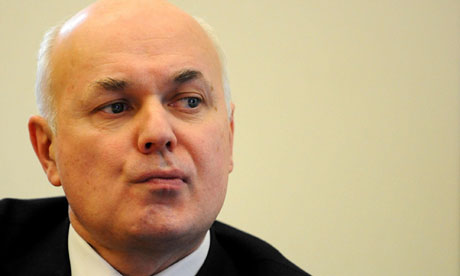'People will forgive you for being wrong, but they will never forgive you for being right - especially if events prove you right while proving them wrong.' Thomas Sowell
Search This Blog
Showing posts with label light. Show all posts
Showing posts with label light. Show all posts
Saturday, 13 July 2024
Sunday, 12 May 2013
Lies, damned lies and Iain Duncan Smith
The way the work and pensions secretary manipulates statistics is a shaming indictment of his department's failings

The work and pensions secretary, Iain Duncan Smith, was reprimanded by the UK's statistics watchdog over his claims about the benefits cap. Photograph: Ian Nicholson/PA
When you see rottenness in a system you must ask: does it come from one bad apple or does the whole barrel stink?
The rank smell emanating from the coalition is impossible to miss. At first sniff, it appears to come from the blazered figure of Iain Duncan Smith. It has taken me some time to identify its source, because appearances deceive. From his clipped hair to his polished shoes, Duncan Smith seems to be a man who has retained the values of the officer corps of the Scots Guards he once served. Conservative commentators emphasise his honour and decency. They speak in reverential tones of his Easterhouse epiphany: the moment in 2002 when he saw the poverty on a Glasgow estate, brushed a manly tear from his eye and vowed to end the "dependency culture" that kept the poor jobless.
Duncan Smith's belief that the welfare state holds down the very people it is meant to serve is pleasing to Conservative ears. To maintain his supporters' illusions, he has to lie. Last week, the UK Statistics Authority gave him a reprimand that broke from the genteel language of the civil service. The work and pensions secretary had claimed that his department's cap on benefits was turning scroungers into strivers – even before it had come into force. "Already we have seen 8,000 people who would have been affected by the cap move into jobs." How sweet those words must have sounded to Conservative ears. The government was forcing the feckless to stop sponging off hard-working taxpayers. (Taxpayers are always "hard working" in British politics, in case you haven't noticed. We never try to get by doing the bare minimum.)
The figures did not show that, the statistics authority said. More to the point, they could not possibly have shown that. Duncan Smith's claims were "unsupported" by the very statistics his department had collected.
If this were a one-off, I would say Duncan Smith "misspoke" or "lacked judgment" or, in plain English, that he was an idiot. If every politician who spun statistics were damned, after all, parliament would be empty. I would use stronger language; indeed, Andrew Dilnot, the chair of the statistics authority, is thinking about sending his inspectors into the Department for Work and Pensions (DWP) because Duncan Smith is a habitual manipulator.
As journalists know, Duncan Smith's modus operandi is well established. His "people" – all of them scroungers, not strivers, who sponge off the taxpayer from their Whitehall offices – brief reporters with unpublished figures. The Tory press uses them, and, as theFinancial Times explained, when his spin doctors meet an honest journalist, who asks hard questions, they end the call and never ring back. By the time the true figures appear on theDWP website , and informed commentators can see the falsity, the spin, the old saying applies: "A lie is halfway round the world before the truth has got its boots on."
Before the benefit cap, it was the work programme, which is meant to provide training for the unemployed. The statistics authority criticised the "coherence" of Duncan Smith's statistics and, once again, the manner in which his department presented them to the public. Far from being a success, the programme found work for a mere 8.6% of the desperate people who went on it. Meanwhile, Jonathan Portes, director of the National Institute of Economic and Social Research and a former chief economist at the Cabinet Office, has convincingly demonstrated that the Tory claim that "more than a third of people who were on incapacity benefit dropped their claims rather than complete a medical assessment" is false and demonstrably false.
Numbers are stronger than words. When the powerful lie with statistics, they do so in the cynical knowledge that the public is more likely to believe them. But the manipulation does not just tell us how sly operators view the credulous masses, but how they see themselves.
The UK Statistics Authority has a fine phrase that guides its mathematicians: "Numbers should be a light, not a crutch". Duncan Smith does not wish to shine light on his policies, for he fears what he may see. He uses his twisted figures as a crutch instead, to help his dogmas hobble along. Francis Wheen once said that the one fact everyone believes they know about a public figure is always wrong. Whatever they think about his policies, the public assumes that Duncan Smith is a gentleman. He is anything but.
Portes thinks there is no wider decay in British government beyond Duncan Smith's department. I am not so sure. The British right is riding off with the loons. Like the Republicans with the Tea Party, the supposedly mainstream Conservatives have decided to woo Ukip rather than fight it. To show that they are "listening", they must pursue policies that make little sense and invent the evidence to support them.
Welfare is already at the centre of the deceit. Duncan Smith's duff data always suggests that the unemployed are on the dole because they are workshy, not because there are no jobs for them to find. If he were to admit for a moment that the distinction between strivers and scroungers was meaningless and all of us could be in a job one day and out of it the next, the rightwing argument on welfare would collapse and then where would the Tories appeal to angry, old white men be?
It is not just Duncan Smith. The health secretary says he will stop foreign "health tourists" costing the NHS hundreds of millions. He has no reputable evidence to support that figure. David Cameron says he wants tax breaks for married couples, when there is no evidence whatsoever that they encourage lovers to marry.
The policies may not work, the ills they seek to combat and the benefits they hope to reap may be illusory. But fear holds Conservatives in its grip and the general election is drawing closer. When pressed, they say that they want to "flag up" their support of marriage, "signal" their dislike of scroungers or "send a message" to illegal immigrants.
Our language has been so corrupted by the euphemisms of advertising and public relations that we no longer realise that what they mean is that they intend to lie.
Thursday, 23 February 2012
Einstein RIP - Your hunch about the speed of light is still true
Faster-than-light neutrinos could be down to bad wiring
What might have been the biggest physics story of the past century may instead be down to a faulty connection.
In September 2011, the Opera experiment reported it had seen particles called neutrinos evidently travelling faster than the speed of light.
The team has now found two problems that may have affected their test in opposing ways: one in its timing gear and one in an optical fibre connection.
More tests from May will determine just how they affect measured speeds.
The Opera collaboration (an acronym for Oscillation Project with Emulsion-Racking Apparatus) was initially started to study the tiny particles as they travelled through 730km of rock between a particle accelerator at the European Organisation for Nuclear Research (Cern) in Switzerland and the Gran Sasso underground laboratory in Italy.
Its goal was to quantify how often the neutrinos change from one type to another on the journey.
But during the course of the experiments the team found that the neutrinos showed up 60 billionths of a second faster than light would have done over the same distance - a result that runs counter to a century's worth of theoretical and experimental physics.
The team submitted the surprising result to the scientific community in an effort to confirm or refute it, and several other experiments around the world are currently working to replicate the result.
A repeat of the experiment by the Opera team will now address whether the issues they have found affect the ultimate neutrino speed they measure.
The two problems the team has identified would have opposing effects on the apparent speed.
This is used to provide start and stop times for the measurement as well as precise distance information.
That problem would increase the measured time of the neutrinos' flight, in turn reducing the surprising faster-than-light effect.
But the team also said they found a problem in the optical fibre connection between the GPS signal and the experiment's main clock.
In contrast, the team said that effect would increase the neutrinos' apparent speed.
Only repeats of the experiments by Opera and other teams will put the matter to rest.
"These latest developments show how hard the OPERA team is working to understand the results," said Dave Wark, a particle physicist from the Rutherford Appleton Laboratory in the UK and committee member of Japan's principal neutrino facility T2K.
"Just as it would have been unwise to jump to the conclusion that the initial results were the result of an anomaly, it would be unwise to make any assumptions now. It is the nature of science that theories have to be tested, re-tested and then tested again".
In a statement, the Opera collaboration said: "While continuing our investigations, in order to unambiguously quantify the effect on the observed result, the collaboration is looking forward to performing a new measurement of the neutrino velocity as soon as a new bunched beam will be available in 2012."
Meanwhile, the Borexino and Icarus experiments, also at Gran Sasso, the Minos experiment based at the US Fermilab, and Japan's T2K facility are all working on their own neutrino speed measurements, with results expected in the next few months.
Subscribe to:
Comments (Atom)
